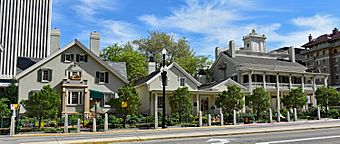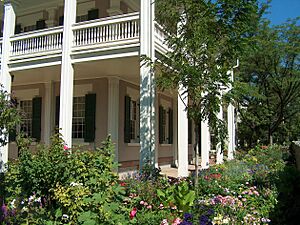Brigham Young Complex facts for kids
|
Brigham Young Complex
|
|

The Brigham Young Complex. From left to right: Lion House, Church Office, Church President's/Governor's Office, and Beehive House.
|
|
| Location | 63-67 E. South Temple, Salt Lake City, Utah |
|---|---|
| Area | less than one acre |
| Built | 1855 |
| Architect | Angell, Truman O.; Ward, William |
| Architectural style | Classical Revival, Late Gothic Revival |
| NRHP reference No. | 66000739 |
Quick facts for kids Significant dates |
|
| Added to NRHP | October 15, 1966 |
| Designated NHLD | January 28, 1964 |
The Brigham Young Complex is a group of important buildings in Salt Lake City, Utah. These buildings were once home to Brigham Young, who was the second President and leader of LDS Church. The complex is located on East South Temple in the heart of Salt Lake City.
This special group of buildings is what remains of a much larger area that belonged to Brigham Young. It includes the Beehive House, which was his family home. It also has the Lion House, which served as his official home when he was the church leader and governor of the Utah Territory. Two smaller office buildings, used for his official work, are also part of the complex. This entire area is recognized as a National Historic Landmark District. This is because of Brigham Young's important role in leading the rapid growth of Mormon settlements across the American West. The complex is found at the southeast corner of the larger Temple Square area, right at the corner of East South Temple and State Street.
History of the Complex
The Brigham Young Complex is separated from newer buildings by a stone wall. Parts of this wall were first built in the 1850s when Brigham Young chose this site. Other parts were moved to the north and west sides of the area because roads were made wider.
Looking from right to left, the complex includes the Beehive House, the President's Office, the Governor's Office, and the Lion House. The buildings look like older styles from the 1800s in New England, with some fancy Gothic details. Truman O. Angell designed these buildings, which were all constructed in the 1850s. The three buildings on the right are now connected by a newer addition at the back.
These houses were where Brigham Young lived from 1852 until he passed away in 1877. As the President of The Church of Jesus Christ of Latter-day Saints (LDS Church), Young and his home were very important. They played a key role in the growth of the Church, the state of Utah, and the American West. In 1964, the two main houses were named a National Historic Landmark. Later, this special recognition was expanded to include the two office buildings as well.
Before these buildings were constructed, Young and his family lived in log structures. He also managed church and territory matters from these older buildings, which no longer exist. The first building that still stands today was the Governor's Office, built between 1852 and 1854. Young used it for his government work in the Deseret Territory, which later became the Utah Territory. The President's Office and the Beehive House were finished in 1855. The President's Office was used for church business. The Beehive House was a formal home for the governor. The Lion House was built between 1855 and 1856. It was designed to house Young's large family with many children.
What the Buildings Are Used For Today
The buildings in the Brigham Young Complex are now owned by The Church of Jesus Christ of Latter-day Saints. The Beehive House is open for visitors to take tours. The Lion House is used as a place for events and gatherings. In 2020, the Brigham Young Complex and other historic sites around Temple Square were temporarily closed to the public. This was due to the COVID-19 pandemic.
See Also
- Brigham Young Historic Park
- List of National Historic Landmarks in Utah
- National Register of Historic Places listings in Salt Lake City
- Temple Square
 | John T. Biggers |
 | Thomas Blackshear |
 | Mark Bradford |
 | Beverly Buchanan |




